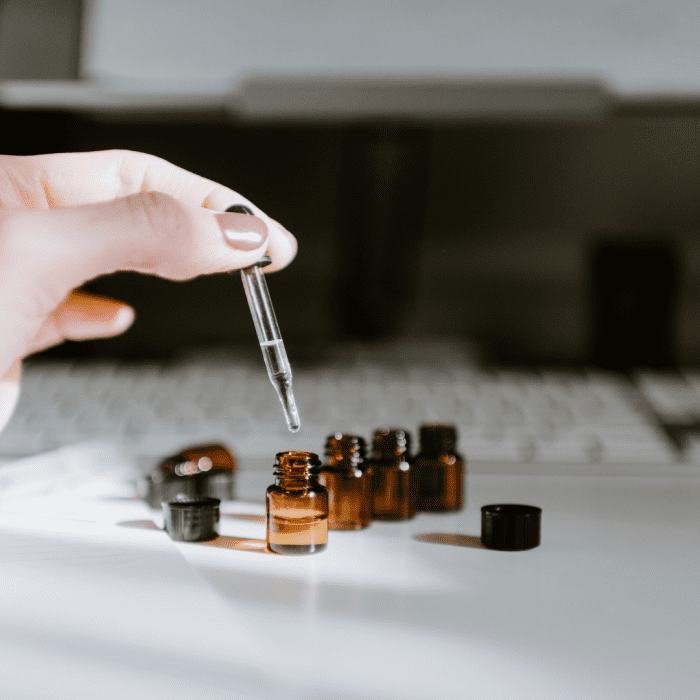Goodbye Smelly Underarms! Best Essential Oils for Body Odor
How to Eliminate Body Odor With Essential Oils
Underarm odor is a bummer, but so are the toxins found in common deodorants. If you have sensitive skin, have sworn off synthetic chemicals, or like the idea of natural, aluminum-free antiperspirants for excessive sweating, you’ll love learning about how and why essential oils can reduce sweating and smelly armpits.
In This Article
- The 10 Best Essential Oils for Body Odor
- How Antibacterial Essential Oils Fight Underarm Odor
- Natural Ingredients and Remedies for Sweat and Body Odor
- 3 Fun, All-Natural DIY Deodorant Recipes
- What Causes Body Odor?
- Lifestyle Changes That Can Reduce Armpit Odor
- Essential Oil Precautions and Safety
The 10 Best Essential Oils for Body Odor
Antibacterial essential oils (EOs) have long been used to combat the growth of “bad” bacteria that cause odor. These EOs are known to contain natural deodorizing properties that keep you smelling fresh:
- Bergamot Oil: Bergamot oil has a refreshing scent and is great for skin disorders. It effectively unclogs pores and balances out oily skin.
- Lavender Oil: Lavender oil is gentle and antimicrobial in nature. It helps to reduce inflammation and is a universally popular scent.
- Lemongrass Oil: Lemongrass oil has great antibacterial properties, is a natural insect repellent, reduces inflammation, and is used in aromatherapy to reduce stress and anxiety.
- Parsley Oil: The deodorizing effect of the chlorophyll in parsley is known to neutralize body odor. Parsley also has antiseptic, antimicrobial, and astringent properties.
- Peppermint Oil: Peppermint oil contains menthol which is an excellent antiseptic agent. Peppermint is also antimicrobial and antiviral in nature.
- Radish Seed Oil: Radish seed oil is effective both as an underarm and foot deodorant. It makes for an excellent moisturizer and helps to reduce free-radical damage and can be used to combat fungal infections.
- Roman Chamomile Oil: Roman chamomile has a light apple scent and is antibacterial in nature. It’s good for sore muscles and has a beautiful yellow-blue color. It’s anti-fungal, anti-inflammatory, and repels insects.
- Rosemary Oil: Rosemary oil may help to reduce tissue inflammation and is thought to fight antibiotic-resistant bacteria strains.
- Sage Oil: Sage oil has excellent antibacterial and antifungal properties. It also helps to reduce eruptive skin conditions.
- Tea Tree Oil: Like rosemary, tea tree oil also contains antibacterial and antifungal properties, which make it an effective natural deodorant.
How Antibacterial Essential Oils Fight Underarm Odor
Treating body odor is indeed easier said than done since each individual’s physiological makeup might respond differently to natural treatment. So just like the cliché statement: “Prevention is still better than cure,” you can use essential oils for prevention.
Essential oils contain antibacterial properties that prevent odor-producing bacteria from overpopulating. According to an article titled “The Effect of Essential Oils on Pathogenic Bacteria,” here’s how they work:
“Essential oils contain a wide variety of secondary metabolites that are capable of inhibiting or slowing the growth of bacteria, yeasts and moulds. Essential oils and their components have activity against a variety of targets, particularly the membrane and cytoplasm, and in some cases, they completely change the morphology of the cells.”
Not only are EOs popular for at-home use, but their antimicrobial capabilities are making headlines in human medicine where conventional medicines prove ineffective against drug-resistant microorganisms.
Natural Ingredients and Remedies for Sweat and Body Odor
To make your own essential oil deodorant or antiperspirant (spray bottle or solid), you can use the following base ingredients:
- Aloe Vera: Aloe vera is very gentle and antimicrobial in nature. It can be rubbed directly on your underarms straight from the bottle or straight from the fresh plant.
- Arrowroot: Arrowroot is great at absorbing wetness and is an excellent binding agent for combined deodorant solids. Organic corn starch may be used as a substitute for arrowroot.
- Baking Soda (Sodium Bicarbonate): Alkaline in nature, baking soda inhibits bacteria growth. Note: Baking soda can irritate and dry out sensitive skin.
- Coconut Oil: Coconut oil offers a gel-like consistency thanks to its medium-chain fatty acids which contain antimicrobial properties and moisturize.
- Grapefruit Seed Extract: Grapefruit seed extract has excellent properties for fighting candida overgrowth and fungus. It is also a great carrier for EOs.
- Magnesium Hydroxide (Milk of Magnesia): Magnesium hydroxide balances skin pH because it’s alkaline in nature. It’s also gentle enough for people with sensitive skin.
- Natural Mineral Salt (Potassium Alum): Often marketed as crystal deodorant, potassium alum comes as a roll-on or spray. The mineral salts in crystal deodorants slow down bacterial growth. Note: This contains low levels of aluminum.
- Witch Hazel: Witch hazel is recognized as an effective natural alternative to conventional deodorant. It is a great carrier for EO blends.
Why Go With Aluminum-Free Antiperspirants?
Some studies suggest that the use and application of aluminum-based antiperspirants may be linked to breast cancer. Aluminum plugs the body’s sweat glands and prevents sweating, but in the process, it can also be absorbed transdermally.
It is also suggested that aluminum may interact with estrogen in the body and can deposit in breast tissue. As noted in the article “Antiperspirant Safety: Should You Sweat It?” the link between aluminum and breast cancer is still unconfirmed. You may preemptively decide to go with natural deodorants and antiperspirants regardless.
Recommended
3 Fun, All-Natural DIY Deodorant Recipes
Once you have chosen the essential oils that you will use to make your natural deodorant, you can experiment with combinations and modify the following three DIY recipes.
Choose Your EO Blend
| bergamot | radish | ylang-ylang |
| lavender | Roman chamomile | cypress |
| lemongrass | rosemary | grapefruit |
| parsley | sage | patchouli |
Tips for Choosing Essential Oil Scents
Some of the suggested oils for higher efficacy include cypress, lavender, and witch hazel. To help you out in choosing which essential oils to use, they are categorized below:
- Soft Floral Scent: Choices include rose, lavender, clary sage, patchouli, and mandarin essential oils.
- Fresh Citrus Scent: Choices include orange blossom, lemongrass, grapefruit, bergamot, and cypress essential oils.
- Light Herbal Scent: Choices include rosemary, sandalwood, juniper, and eucalyptus essential oils.
DIY Essential Oil Deodorant Spray
This spray-on deodorizing recipe is easy to make and is light and mess-free—all you need is a spare spray bottle and a few ingredients.
Supplies
- 10 drops lavender oil
- 10 drops cypress oil
- 10 drops grapefruit seed extract
- 28 ounces witch hazel
- 1 spray bottle
Instructions
- Mix 28 ounces of witch hazel with 10 drops each of lavender oil, cypress oil, and grapefruit seed extract.
- Mix the ingredients well to make sure they are fully incorporated. Then, pour the mixture into a separate container.
- Shake the essential oil mixture before spraying it onto your underarms. Use this regularly until the body odor problem is completely gone.
DIY Coconut Oil and Baking Soda Deodorant
You can make your own coconut oil and baking soda deodorant/antiperspirant. This recipe comes from the site Wellness Mama.
Supplies
- 6 tablespoons coconut oil
- 1/4 cup baking soda
- 1/4 cup organic corn starch (or arrowroot)
- essential oils of your choice
- empty glass jar or deodorant canister
Instructions
- Mix the baking soda and organic corn starch together.
- Incorporate the coconut oil into the powder blend with a fork.
- Add essential oils if desired (follow proper dilution protocols).
- Store the concoction in an old container or glass jar.
DIY Odor-Blocker Using Essential Oils
Body-odor blockers utilize natural substances like essential oils. A combination of essential oils is highly suggested for this recipe to ensure higher effectiveness due to the presence of various properties.
Supplies
- 20 drops of essential oils
- A couple of teaspoons of vodka (better than rubbing alcohol)
- An ounce of white vinegar
- A cup of purified water (or distilled)
- Mixing bowl
- Spray bottle
Instructions
- Add the essential oils to the vodka in a mixing bowl.
- Add the white vinegar into the mixture and mix thoroughly before pouring it into a separate spray container.
- Pour the purified water into the mixture and shake it thoroughly. (Always do this prior to application since the ingredients might separate during storage.)
What Causes Body Odor?
Skin is slightly acidic and does a good job of protecting your body from bacteria. When you sweat from your apocrine glands, however, bacteria metabolize sweat and produce odor. It’s not your sweat that actually smells, it’s the bacteria breaking down your sweat.
Antiperspirants essentially starve bacteria, and antibacterial and alkaline products make the environment (your underarm) an inhospitable place. Other factors that contribute to the causes of body odor include:
- genetics
- hormones
- activity level
- hygiene
- diet
- underlying disease
Hence, one’s diet actually plays a crucial role in contributing to body odor and toxins in the body. Your hormonal activity also contributes to odor since imbalances can result in abnormal sweating, which leads to more bacteria and odor.
Lifestyle Changes That Can Eliminate Armpit Odor
Look at your lifestyle and diet patterns as potential contributors to your problem. A number of natural methods can be followed for the treatment of unwanted body odor. These methods include lifestyle changes, constant bathing to rid yourself of bacteria, the proper choice of clothing and fabric, diet, avoiding tobacco, caffeine, certain medications, and controlling your rate of perspiration.
Your diet is a common culprit in this problem and altering your eating habits may help to eliminate body odor. Eating lots of spice contributes to the accumulation of odor-causing emissions.
Consider a Plant-Based Diet
Green, leafy vegetables, fresh fruits, whole grains, raw nuts or seeds, and soy products are highly recommended to prevent and combat body odor. Avoid consuming too much red meat since it can promote stagnation inside your body. In addition, you may want to consider abstaining from eating foods high in sugar, hydrogenated oil, and refined white flour.
If possible, switch to a plant-based diet since the phytonutrients and chlorophyll from plants are known to help cleanse your body. You can also incorporate a lot of herbs such as oregano, thyme, rosemary, and sage into your dishes for added flavor and more fighting action against body odor.
Essential Oil Precautions and Safety
Anyone willing to find a cure for body odor may resort to just about any measures. Some remedies might just do more harm than good. Not everything that is said to cure can actually work like magic, which is why you need to be extra wary even when using natural remedies. Furthermore, take note of what other measures can produce more effective results with the use of these natural treatments.
Here are some tips and warnings to consider:
- Take proper note of the instructions and steps indicated when using essential oils to remedy body odor. This will prevent sensitivities and ensure that you get effective results. Take particular note of proper dosage and combinations of essential oils.
- Avoid using the essential oil mixtures on freshly shaven underarms as it can produce a stinging sensation or cause irritation.
- Undiluted essential oils can cause skin burns and scarring.
- If you live with small children or animals, be especially cautious. Accidental essential oil ingestion can result in serious side effects, poisoning, and even death.













